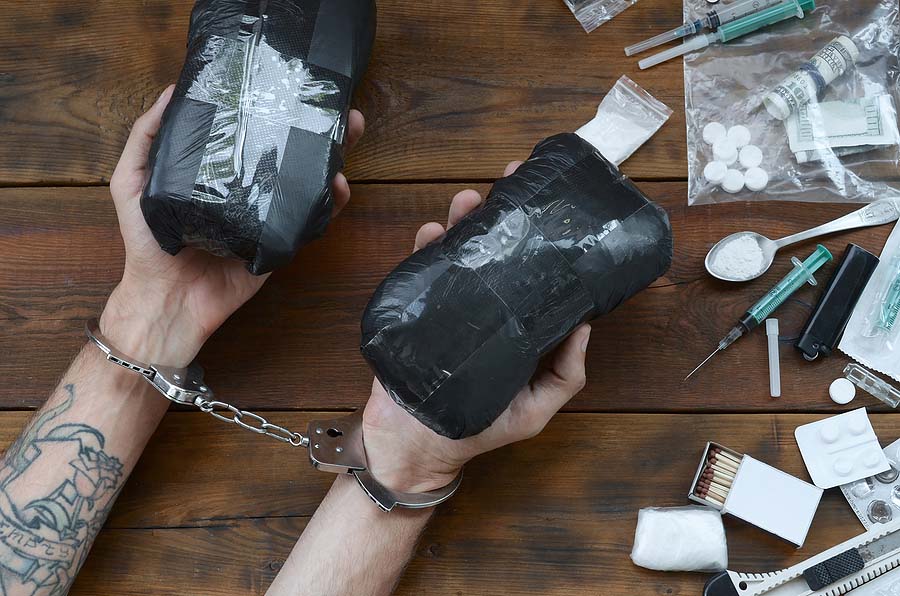Mauritius, a picturesque island nation in the Indian Ocean, faces a significant challenge with drug trafficking and abuse, particularly with the rise of synthetic drugs. Despite efforts to curb the issue, the drug trade remains a pressing concern, impacting public health, social stability, and economic development. This article explores strategies to improve government systems in Mauritius to combat drug trafficking, drawing comparisons with approaches in South Africa and the United States at the state level. Additionally, it highlights some of the most significant drug cases in Mauritius to contextualize the issue.
Current State of Drug Trafficking in Mauritius
Mauritius has a long history of drug use, dating back to the 1970s with the introduction of heroin. The 2010 World Drug Report identified Mauritius as having the highest prevalence of opioid use in Africa. While traditional drugs like cannabis and heroin remain prevalent, synthetic drugs, such as new psychoactive substances (NPS), have surged since 2015, with arrests doubling annually to 1,059 by 2018. Synthetic drugs, manufactured in laboratories to mimic substances like marijuana or cocaine, are cheap and accessible, posing a significant burden on law enforcement and public health systems. The ENACT Organised Crime Index ranks Mauritius as the top country in the Southern African Development Community (SADC) region for synthetic drug trade.
The government has adopted a public health-oriented approach, moving away from a punitive “war on drugs” model. Initiatives include harm-reduction strategies, needle exchange programs, methadone substitution therapy, and the establishment of the National Drug Observatory in 2015. However, challenges such as corruption, inadequate legislation, and limited resources hinder progress. Public trust in institutions like the Anti-Drug and Smuggling Unit (ADSU) is low, with allegations of mafia influence and political protection of drug networks.
Proposed Improvements for Mauritius’ Government Systems
To effectively combat drug trafficking, Mauritius must strengthen its government systems through legislative reforms, institutional enhancements, and community engagement. Below are key recommendations:
1. Legislative Reforms
- Enact Specific Laws for Synthetic Drugs: Mauritius should adopt legislation similar to Ireland’s Psychoactive Substance Act of 2010, which bans the import, export, and sale of harmful psychoactive substances. This would address the loophole where precursor chemicals are legal until processed into illicit drugs. The Dangerous Drugs Act (DDA) was amended in 2019 to include some synthetic chemicals, but further expansion is needed to cover emerging NPS.
- Strengthen Anti-Money Laundering Laws: Drug trafficking generates significant illicit profits, often laundered through real estate, casinos, and other businesses. Enhancing the Financial Intelligence and Anti-Money Laundering Act and empowering the Independent Commission Against Corruption (ICAC) to trace and seize illicit funds could disrupt drug networks.
- Precursor Chemical Regulation: Implement stricter controls on precursor chemicals used in synthetic drug production, requiring importers and pharmacists to report transactions via an online platform monitored by the Pharmacy Board and Mauritius Customs Service.
2. Institutional Strengthening
- Reform the Anti-Drug and Smuggling Unit (ADSU): The 2018 Commission of Inquiry recommended dismantling ADSU due to corruption and ineffectiveness. Instead, a new, independent anti-narcotics agency with vetted personnel, advanced training, and oversight mechanisms could restore public trust and improve efficiency.
- Enhance the National Drug Observatory: The Observatory should develop an early warning system to monitor synthetic drug trends, providing real-time data to inform policy and prevention programs. Collaboration with international bodies like the UN Office on Drugs and Crime (UNODC) could enhance its capabilities.
- Improve Customs and Border Control: Mauritius Customs Service has made strides with units like the NarcoPort and NarcoAirport, but investment in non-intrusive inspection tools, detector dogs, and intelligence-sharing with countries like Reunion and Madagascar is crucial. Participation in the WCO’s Customs Enforcement Network (CEN) and Pre-Export Notification (PEN) system should be expanded.
3. Public Health and Prevention
- Expand Harm-Reduction Programs: Methadone therapy and needle exchange programs have reduced heroin use, but similar initiatives for synthetic drug users are lacking. Peer-led outreach and mobile clinics could reach vulnerable populations, particularly youth.
- Targeted Awareness Campaigns: Incorporate NPS information into school curricula and public campaigns, emphasizing the dangers of synthetic drugs like “Black Mamba” and “Rambo.” Community-based programs involving NGOs and religious organizations could amplify outreach.
- Increase Treatment Capacity: With approximately 900 drug-related in-patient cases annually, public health institutions are strained. Expanding rehabilitation centers and training healthcare workers in addiction treatment could address this gap.
4. Community and International Collaboration
- Engage Civil Society: The government should partner with NGOs, community leaders, and social workers to build trust and gather intelligence. Programs like the Collectif Urgence Toxida (CUT) demonstrate the value of community involvement.
- Strengthen Regional Cooperation: Mauritius should deepen ties with SADC countries and international partners to disrupt trafficking routes, particularly the “southern route” from Afghanistan through Pakistan and East Africa. Joint operations with South Africa and Madagascar have led to significant seizures, such as 333.1 kg of cannabis in 2024.
5. Addressing Corruption
- Independent Oversight: Establish an independent body to oversee anti-drug operations, ensuring transparency and accountability. Regular audits of ADSU and related agencies could deter corruption.
- Protect Whistleblowers: Legislation to protect whistleblowers reporting drug-related corruption could expose high-level protection of drug networks, as alleged in the 2018 Commission report.
Comparative Analysis: South Africa and the United States
South Africa
South Africa faces a complex drug problem, exacerbated by its history of apartheid, which created socioeconomic disparities fueling substance abuse. The National Drug Master Plan identifies drugs as a driver of crime, poverty, and social dysfunction. Key substances include cannabis, methamphetamine (“tik”), and heroin, with synthetic drugs like methamphetamines gaining traction.
State-Level Approaches:
- Western Cape: The province, including Cape Town, has a high prevalence of methamphetamine use. The South African Community Epidemiology Network on Drug Use (SACENDU) monitors treatment demand, revealing that methamphetamine is a primary substance for admissions in the Western Cape. The province employs community policing forums and collaborates with NGOs to provide prevention and rehabilitation services. However, limited treatment facilities and corruption in law enforcement hinder progress.
- Gauteng: Home to Johannesburg, Gauteng focuses on intelligence-led policing and task forces to disrupt drug syndicates. The South African Police Service (SAPS) conducts high-profile operations, but arrests often target low-level dealers, leaving major traffickers untouched. Rehabilitation programs are urban-centric, leaving rural areas underserved.
- KwaZulu-Natal: This province battles heroin trafficking along the “southern route” from Afghanistan. The Durban port is a major entry point, prompting increased customs surveillance. Community-based prevention programs, supported by the Department of Social Development, aim to reduce demand, but funding shortages limit impact.
Lessons for Mauritius:
- Data-Driven Policy: SACENDU’s monitoring provides valuable insights, suggesting Mauritius’ National Drug Observatory could adopt similar methodologies.
- Community Engagement: South Africa’s community policing forums highlight the importance of local involvement, which Mauritius could replicate through neighborhood watch programs.
- Challenges: Corruption and underfunded treatment systems underscore the need for Mauritius to prioritize transparency and resource allocation.
United States
The U.S. faces a severe drug crisis, with opioids (e.g., fentanyl), methamphetamine, and cocaine driving overdoses and crime. State-level responses vary due to federalism, offering diverse models for Mauritius.
State-Level Approaches:
- California: California combines aggressive law enforcement with progressive public health measures. The state’s Drug Enforcement Task Forces target trafficking networks, while Proposition 36 diverts non-violent drug offenders to treatment instead of prison. Harm-reduction strategies, like supervised injection sites in San Francisco, reduce overdose deaths but face political resistance. California’s robust data collection through the Department of Public Health informs policy.
- Florida: Florida focuses on disrupting prescription drug abuse and fentanyl trafficking. The Statewide Task Force on Opioid Abuse coordinates law enforcement, healthcare, and community efforts. Prescription Drug Monitoring Programs (PDMPs) track controlled substances, reducing “pill mills.” However, racial disparities in policing remain a challenge.
- New York: New York emphasizes prevention and treatment, with initiatives like the Opioid Overdose Prevention Program providing naloxone to first responders. The state’s Office of Addiction Services and Supports funds extensive rehabilitation networks. Task forces target fentanyl smuggling through ports, but urban-rural disparities in access to care persist.
Lessons for Mauritius:
- Diversion Programs: California’s treatment-over-incarceration model could inspire Mauritius to expand methadone and rehabilitation programs for non-violent offenders.
- Data Systems: Robust data collection in California and New York highlights the need for Mauritius to enhance its National Drug Observatory’s capabilities.
- Task Force Model: Florida’s coordinated task forces suggest Mauritius could benefit from a multi-agency anti-drug unit integrating customs, police, and health services.
- Challenges: Political resistance to harm-reduction and policing disparities warn Mauritius to build public consensus and ensure equitable enforcement.
Major Drug Cases in Mauritius
To illustrate the scale of the drug problem, below are some of the most significant drug cases in Mauritius:
- 333.1 kg Cannabis Seizure (January 2024): Mauritius Customs and the National Coast Guard seized 333.1 kg of cannabis at sea, originating from South Africa. The operation targeted a livestock carrier with Indian and Tanzanian crew members, highlighting the use of maritime routes for trafficking. This case underscores the importance of regional cooperation and maritime surveillance.
- Extradition Case (2020): A passenger detained by Mauritius Customs for carrying undeclared cash was suspected of drug trafficking. After missing his flight, he booked another via Reunion Island, paying in cash, raising red flags. The case was referred to the Financial Crime Commission (FCC), leading to his arrest and extradition to Reunion Island, where he was convicted of drug dealing. This case demonstrates the link between money laundering and drug trafficking.
- Parc Coson Drug Market (2021): In Roche Bois, Port Louis, the Parc Coson slum operates as Mauritius’ drug-selling capital. Despite COVID-19 lockdowns, drug sales continued unabated, with lookouts (“martins”) facilitating transactions. The case exposed systemic corruption, as police patrols reportedly ignored the area, suggesting protection of drug networks.
- Synthetic Drug Deaths (2020): The death of a policewoman during an anti-narcotics operation and 15 fatalities linked to synthetic drug use highlighted the growing crisis. The National Drug Observatory reported that 41% of drug-related arrests involved synthetics, underscoring the need for targeted legislation and enforcement.
- Mafia Influence Allegations (2018): The Commission of Inquiry found evidence of mafia influence over police, prison guards, lawyers, and politicians. A suspected drug lord under investigation for money laundering reportedly enjoyed political protection, fueling public distrust. This case emphasizes the urgency of addressing corruption.
Mauritius stands at a critical juncture in its fight against drug trafficking. By enacting targeted legislation, reforming institutions, expanding public health initiatives, and fostering community and international collaboration, the government can build a more resilient system. South Africa’s community engagement and data-driven approaches, alongside the U.S.’s diversion programs and task force models, offer valuable lessons. However, Mauritius must address corruption and public distrust to ensure sustainable progress. The significant drug cases outlined above highlight the urgency of action to safeguard the nation’s future.
References
- ISS Africa, “Mauritius battles a growing synthetic drugs problem,” 2020.
- ENACT Africa, “Synthetic drugs on the rise despite Mauritius’s best efforts,” 2020.
- Wikipedia, “Drug trafficking in Mauritius,” 2012.
- Mauritius Customs Service, “Drug trafficking: an overview,” 2024.
- Al Jazeera, “The return of drug abuse to Mauritius,” 2023.
- Daily Maverick, “Drugs markets in the islands of the western Indian Ocean,” 2021.
- Afrobarometer, “Mauritians rank drug abuse as second-most important problem,” 2024.





